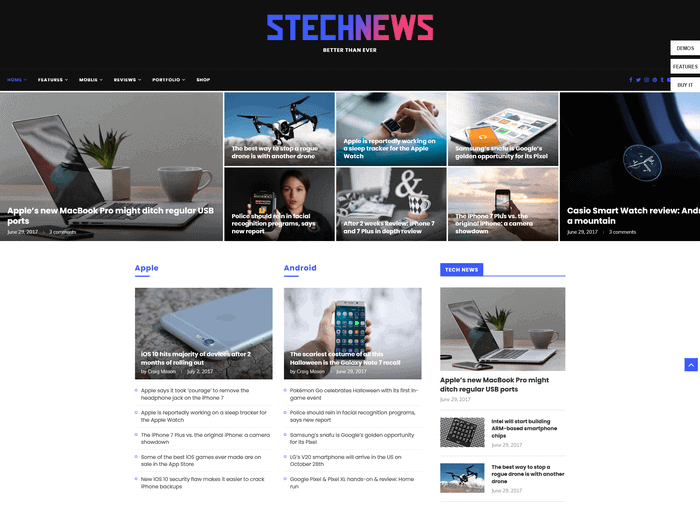Exactly How Blockchain Modern Technology Is Revolutionizing Information Protection
Blockchain innovation is fundamentally altering the landscape of data safety by introducing a decentralized structure that promises enhanced transparency and resilience. Unlike conventional systems, which rely on central information databases, blockchain disperses data across a network, minimizing vulnerabilities and single factors of failing. Using sophisticated cryptographic methods makes certain that data remains tamper-proof, fostering trust fund among stakeholders and individuals. As markets quickly adjust to this technology, inquiries arise regarding its wider effect and possible difficulties. What ramifications does this change hold for future data security approaches and governing structures? The solutions might stun you (Best tech blog).
The Essentials of Blockchain
Blockchain innovation, an advanced principle in electronic information monitoring, fundamentally changes how information is saved and safeguarded. At its core, a blockchain is a distributed ledger that tapes deals across a network of computer systems, guaranteeing openness and immutability.
Secret to comprehending blockchain is the hashing process, which encrypts purchase information right into an unique alphanumeric code. This cryptographic function makes sure that any kind of alteration in the purchase information leads to a totally various hash, therefore securing against tampering. The agreement mechanism, one more important part, verifies and confirms new transactions via a network of nodes, therefore eliminating the need for a central authority.
Additionally, blockchain's append-only structure guarantees that information, once included, can not be erased or modified. This characteristic warranties a long-term and proven document of purchases, cultivating count on among individuals. As a result, blockchain provides a robust framework for data stability, supplying sectors a reliable technique for monitoring and managing electronic information in a safe, transparent way.
Decentralization and Protection
Decentralization, a core concept of blockchain innovation, considerably enhances data safety by distributing control across a network instead of relying upon a particular, central entity. This circulation alleviates the threat of single factors of failure, which prevail in standard central systems. By spreading data across many nodes, blockchain ensures that even if one node is endangered, the whole network remains protected. This redundancy not just strengthens the honesty of the data but also enhances its strength to cyberattacks and system failures.

Each participant in the network has access to the entire blockchain, permitting them to confirm and audit purchases individually. In general, decentralization is crucial in boosting data protection in blockchain networks.

Cryptographic Techniques
At the heart of blockchain innovation, cryptographic methods play a pivotal duty in securing information, guaranteeing both confidentiality and integrity. Cryptography in blockchain employs a combination of symmetric and uneven formulas to secure data, making it available just to accredited celebrations.
Hash functions are one more important element, transforming input data right into a fixed-size string of characters, efficiently creating an one-of-a-kind digital finger print for each and every block. This guarantees that any effort to change the information will certainly lead to a completely various hash, thus keeping the immutability of the blockchain. Electronic signatures validate the credibility and stability of purchases, supplying a layer of non-repudiation.
The decentralized nature of blockchain, incorporated with robust cryptographic strategies, gets rid of the need for intermediaries, minimizing potential susceptabilities. As blockchain modern technology develops, advancements in cryptography such as zero-knowledge evidence and homomorphic encryption remain to improve security procedures, further fortifying data protection in this advanced electronic journal system.
Use Situations Throughout Industries

In the medical care sector, blockchain guarantees the safe and secure storage and sharing of client documents, advertising interoperability while securing sensitive data from unauthorized gain access to. This innovation equips individuals with control over their case history and promotes smooth sychronisation among doctor.
Supply chain administration advantages dramatically from blockchain's unalterable ledger, dig this which makes certain traceability and credibility of items from beginning to customer. By improving transparency, blockchain helps alleviate problems such as counterfeiting and unethical sourcing.
Furthermore, blockchain's decentralized nature is improving the energy field by making it possible for peer-to-peer energy trading, where customers can get and sell excess renewable resource straight. This fosters a more sustainable and effective power environment.
In the realm of copyright, blockchain gives a tamper-proof platform for makers to register and secure their jobs, making sure rightful attribution and fair payment. These varied usage instances highlight blockchain's duty as a crucial pressure in redefining data safety across markets.
Future of Data Defense
As we seek to the future of information defense, blockchain modern technology is positioned to play an essential duty in safeguarding electronic information. With its decentralized and immutable characteristics, blockchain provides a durable structure for securing sensitive information versus unapproved gain access to and cyber hazards. This technology guarantees that once information is tape-recorded, it is nearly difficult to alter without discovery, therefore offering a significant advantage over standard data storage methods.
The integration of blockchain straight from the source with various other advanced technologies, such as expert system and the Web of Points (IoT), is expected to enhance information security methods even more. By look at this web-site leveraging smart agreements, companies can automate and implement protection protocols, lowering human error and raising effectiveness. Furthermore, blockchain's ability to supply clear and deducible purchases will certainly reinforce trust fund and responsibility in data administration techniques.
As regulative landscapes develop, blockchain's compliance-friendly nature will come to be increasingly pertinent. It can help organizations satisfy stringent data protection guidelines, such as the General Information Protection Regulation (GDPR) and the California Consumer Personal Privacy Act (CCPA), by providing verifiable records of information handling activities. Eventually, blockchain's one-of-a-kind attributes setting it as a transformative device in the continuous pursuit to safeguard the digital world against ever-evolving cyber dangers.
Verdict
Blockchain innovation represents a paradigm shift in data protection by leveraging decentralization and cryptographic techniques to enhance transparency, trust fund, and data integrity. Its ability to remove solitary factors of failing and use agreement devices considerably decreases the danger of fraud and cyberattacks. This innovative framework not just empowers users with greater control over their data but likewise lines up with regulative conformity. As cyber risks progress, blockchain becomes a crucial device for robust information defense throughout various industries.
Blockchain innovation is basically changing the landscape of data security by presenting a decentralized structure that assures improved transparency and resilience. Unlike standard systems, which depend on central information databases, blockchain disperses data throughout a network, lessening susceptabilities and solitary points of failure.Decentralization, a core principle of blockchain innovation, dramatically enhances data protection by distributing control throughout a network rather than relying on a single, centralized entity.At the heart of blockchain technology, cryptographic techniques play an essential role in securing data, ensuring both privacy and honesty.Blockchain modern technology stands for a standard shift in data safety by leveraging decentralization and cryptographic strategies to improve openness, count on, and data stability.